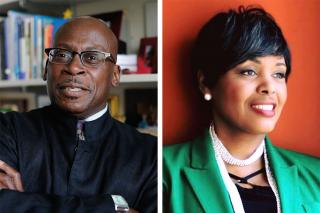A message from the co-chairs of the President’s Advisory Council on Diversity, Equity, and Inclusion
We have been reflecting upon the complex history of our nation and recognize the many contributions and sacrifices indigenous peoples have been forced to make as a result of colonialization and generations of displacement and dispossession from the land of their ancestors’ birth.
As the co-chairs of the President’s Advisory Council on Diversity, Equity, and Inclusion, our charge – our shared “call to action” – has been to identify ways that members of the Simmons community can engage in everyday inclusive leadership and actively work to dismantle the systems, policies, and practices that are barriers to true inclusion and belonging.
As a dynamic community of scholars, educators, and leaders we must be engaged in the important work that moves from the recognition of the longstanding systemic inequities that continue to negatively impact so many communities, and commit to a transformative process that works towards the realization of a more just and inclusive today, and tomorrow. This is especially true during what has been called a moment of racial reckoning. As we consider the meaning of this Indigenous Peoples’ Day, we must also bear witness to the painful legacy of the land upon which we live, learn, and work.
As a University, a city, and a nation, it is important that we actively promote an increased recognition of the traumatic legacy and continued contributions of the nation’s indigenous peoples. Earlier this week, Acting Boston Mayor Kim Janey declared Monday October 11 to be Indigenous Peoples’ Day in Boston, and that it would thus remain into the future. In addition, President Biden today issued the first-ever presidential proclamation about Indigenous Peoples’ Day. In a subsequent Columbus Day proclamation, he reminded us that we must not ignore past events and injustices. Instead, we can “face them honestly, bring them to light, and do all we can to address them.” As James Baldwin so eloquently stated, “not everything can be changed, but nothing can be changed that isn’t faced.”
Finally, at a very local level, Simmons and our neighboring institutions are working with the Colleges of the Fenway to recognize Indigenous Peoples’ Day. In a new statement, COF reminds us that “those gathering, both in-person and virtually, must first acknowledge the land upon which our institutions occupy. Our institutions are located on the traditional and ancestral lands of the Wampanoag, the Massachusett, the Nipmuc, and the Abenaki tribes. From Manchester to Boston to Worcester, our campuses strive to nurture community, collaboration, and respect for our students, staff, faculty, and alumni. As an extension of this spirit, we commit to knowing better and doing better for those who honored this land first. We pay respect to the people of the Wampanoag, the Massachusett, the Nipmuc, and the Abenaki tribes, past, present, and future.”
In addition, the Colleges of the Fenway will collaborate on an upcoming education forum to learn more about Indigenous Peoples’ Day. Simmons is also reviewing the academic calendar in an effort to best recognize this day as a holiday in the future. We also want to share a variety of Indigenous Peoples’ Day events that are taking place across Massachusetts. You can also access these additional helpful resources to learn more about the indigenous peoples in our area:
- The North American Indian Center of Boston
- Commission on Indian Affairs of Massachusetts
- Historical Village of Massachusett Nation
- Praying Indians of Natick and Ponkapoaq
- Nipmuc Nation
- Abenaki Tribe
As we do the hard work of creating a truly inclusive community, each of us has a role to play through our words, actions, and education. Thank you for continuing your individual and collective efforts to be a community that not only welcomes, but empowers all the different elements of diversity.
As Lila Watson, an indigenous Australian(MurrI) artist and activist, said, “If you have come here to help me you are wasting your time, but if you have come because your liberation is bound up with mine, then let us work together.”
Thank you,
Sharron Credle, Ed.D & Gary Bailey, DHL,MSW, ACSW
Co-Chairs of The President's Advisory Council for Diversity, Equity, & Inclusion

